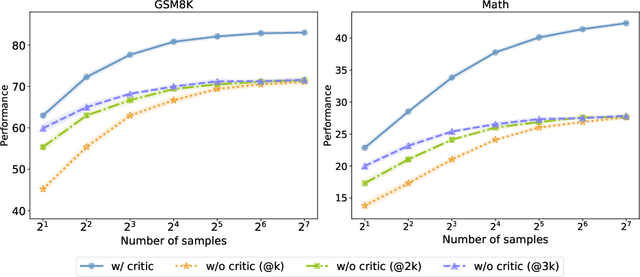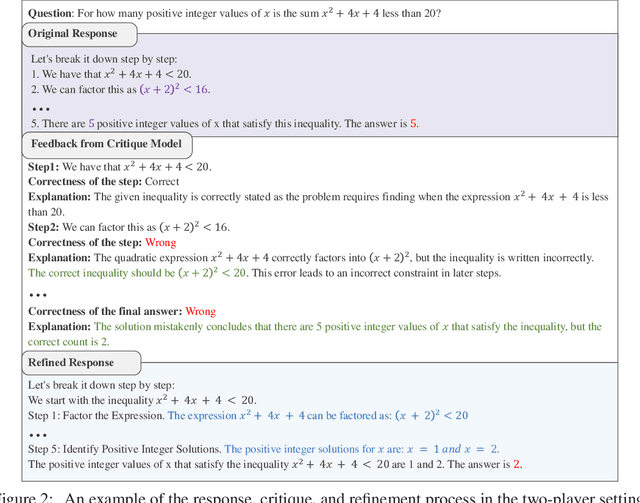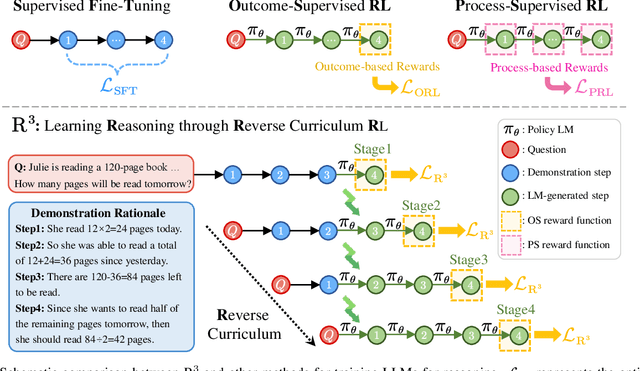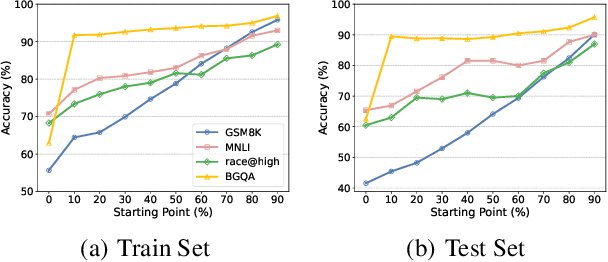Boyang Hong
Better Process Supervision with Bi-directional Rewarding Signals
Mar 06, 2025Abstract:Process supervision, i.e., evaluating each step, is critical for complex large language model (LLM) reasoning and test-time searching with increased inference compute. Existing approaches, represented by process reward models (PRMs), primarily focus on rewarding signals up to the current step, exhibiting a one-directional nature and lacking a mechanism to model the distance to the final target. To address this problem, we draw inspiration from the A* algorithm, which states that an effective supervisory signal should simultaneously consider the incurred cost and the estimated cost for reaching the target. Building on this key insight, we introduce BiRM, a novel process supervision model that not only evaluates the correctness of previous steps but also models the probability of future success. We conduct extensive experiments on mathematical reasoning tasks and demonstrate that BiRM provides more precise evaluations of LLM reasoning steps, achieving an improvement of 3.1% on Gaokao2023 over PRM under the Best-of-N sampling method. Besides, in search-based strategies, BiRM provides more comprehensive guidance and outperforms ORM by 5.0% and PRM by 3.8% respectively on MATH-500.
Enhancing LLM Reasoning via Critique Models with Test-Time and Training-Time Supervision
Nov 25, 2024



Abstract:Training large language models (LLMs) to spend more time thinking and reflection before responding is crucial for effectively solving complex reasoning tasks in fields such as science, coding, and mathematics. However, the effectiveness of mechanisms like self-reflection and self-correction depends on the model's capacity to accurately assess its own performance, which can be limited by factors such as initial accuracy, question difficulty, and the lack of external feedback. In this paper, we delve into a two-player paradigm that separates the roles of reasoning and critique models, where the critique model provides step-level feedback to supervise the reasoning (actor) model during both test-time and train-time. We first propose AutoMathCritique, an automated and scalable framework for collecting critique data, resulting in a dataset of $76,321$ responses paired with step-level feedback. Fine-tuning language models with this dataset enables them to generate natural language feedback for mathematical reasoning. We demonstrate that the critique models consistently improve the actor's performance on difficult queries at test-time, especially when scaling up inference-time computation. Motivated by these findings, we introduce the critique-based supervision to the actor's self-training process, and propose a critique-in-the-loop self-improvement method. Experiments show that the method improves the actor's exploration efficiency and solution diversity, especially on challenging queries, leading to a stronger reasoning model. Lastly, we take the preliminary step to explore training self-talk reasoning models via critique supervision and showcase its potential. Our code and datasets are at \href{https://mathcritique.github.io/}{https://mathcritique.github.io/}.
AgentGym: Evolving Large Language Model-based Agents across Diverse Environments
Jun 06, 2024



Abstract:Building generalist agents that can handle diverse tasks and evolve themselves across different environments is a long-term goal in the AI community. Large language models (LLMs) are considered a promising foundation to build such agents due to their generalized capabilities. Current approaches either have LLM-based agents imitate expert-provided trajectories step-by-step, requiring human supervision, which is hard to scale and limits environmental exploration; or they let agents explore and learn in isolated environments, resulting in specialist agents with limited generalization. In this paper, we take the first step towards building generally-capable LLM-based agents with self-evolution ability. We identify a trinity of ingredients: 1) diverse environments for agent exploration and learning, 2) a trajectory set to equip agents with basic capabilities and prior knowledge, and 3) an effective and scalable evolution method. We propose AgentGym, a new framework featuring a variety of environments and tasks for broad, real-time, uni-format, and concurrent agent exploration. AgentGym also includes a database with expanded instructions, a benchmark suite, and high-quality trajectories across environments. Next, we propose a novel method, AgentEvol, to investigate the potential of agent self-evolution beyond previously seen data across tasks and environments. Experimental results show that the evolved agents can achieve results comparable to SOTA models. We release the AgentGym suite, including the platform, dataset, benchmark, checkpoints, and algorithm implementations. The AgentGym suite is available on https://github.com/WooooDyy/AgentGym.
Training Large Language Models for Reasoning through Reverse Curriculum Reinforcement Learning
Feb 08, 2024



Abstract:In this paper, we propose R$^3$: Learning Reasoning through Reverse Curriculum Reinforcement Learning (RL), a novel method that employs only outcome supervision to achieve the benefits of process supervision for large language models. The core challenge in applying RL to complex reasoning is to identify a sequence of actions that result in positive rewards and provide appropriate supervision for optimization. Outcome supervision provides sparse rewards for final results without identifying error locations, whereas process supervision offers step-wise rewards but requires extensive manual annotation. R$^3$ overcomes these limitations by learning from correct demonstrations. Specifically, R$^3$ progressively slides the start state of reasoning from a demonstration's end to its beginning, facilitating easier model exploration at all stages. Thus, R$^3$ establishes a step-wise curriculum, allowing outcome supervision to offer step-level signals and precisely pinpoint errors. Using Llama2-7B, our method surpasses RL baseline on eight reasoning tasks by $4.1$ points on average. Notebaly, in program-based reasoning on GSM8K, it exceeds the baseline by $4.2$ points across three backbone models, and without any extra data, Codellama-7B + R$^3$ performs comparable to larger models or closed-source models.
MouSi: Poly-Visual-Expert Vision-Language Models
Jan 30, 2024Abstract:Current large vision-language models (VLMs) often encounter challenges such as insufficient capabilities of a single visual component and excessively long visual tokens. These issues can limit the model's effectiveness in accurately interpreting complex visual information and over-lengthy contextual information. Addressing these challenges is crucial for enhancing the performance and applicability of VLMs. This paper proposes the use of ensemble experts technique to synergizes the capabilities of individual visual encoders, including those skilled in image-text matching, OCR, image segmentation, etc. This technique introduces a fusion network to unify the processing of outputs from different visual experts, while bridging the gap between image encoders and pre-trained LLMs. In addition, we explore different positional encoding schemes to alleviate the waste of positional encoding caused by lengthy image feature sequences, effectively addressing the issue of position overflow and length limitations. For instance, in our implementation, this technique significantly reduces the positional occupancy in models like SAM, from a substantial 4096 to a more efficient and manageable 64 or even down to 1. Experimental results demonstrate that VLMs with multiple experts exhibit consistently superior performance over isolated visual encoders and mark a significant performance boost as more experts are integrated. We have open-sourced the training code used in this report. All of these resources can be found on our project website.
The Rise and Potential of Large Language Model Based Agents: A Survey
Sep 19, 2023



Abstract:For a long time, humanity has pursued artificial intelligence (AI) equivalent to or surpassing the human level, with AI agents considered a promising vehicle for this pursuit. AI agents are artificial entities that sense their environment, make decisions, and take actions. Many efforts have been made to develop intelligent agents, but they mainly focus on advancement in algorithms or training strategies to enhance specific capabilities or performance on particular tasks. Actually, what the community lacks is a general and powerful model to serve as a starting point for designing AI agents that can adapt to diverse scenarios. Due to the versatile capabilities they demonstrate, large language models (LLMs) are regarded as potential sparks for Artificial General Intelligence (AGI), offering hope for building general AI agents. Many researchers have leveraged LLMs as the foundation to build AI agents and have achieved significant progress. In this paper, we perform a comprehensive survey on LLM-based agents. We start by tracing the concept of agents from its philosophical origins to its development in AI, and explain why LLMs are suitable foundations for agents. Building upon this, we present a general framework for LLM-based agents, comprising three main components: brain, perception, and action, and the framework can be tailored for different applications. Subsequently, we explore the extensive applications of LLM-based agents in three aspects: single-agent scenarios, multi-agent scenarios, and human-agent cooperation. Following this, we delve into agent societies, exploring the behavior and personality of LLM-based agents, the social phenomena that emerge from an agent society, and the insights they offer for human society. Finally, we discuss several key topics and open problems within the field. A repository for the related papers at https://github.com/WooooDyy/LLM-Agent-Paper-List.
 Add to Chrome
Add to Chrome Add to Firefox
Add to Firefox Add to Edge
Add to Edge